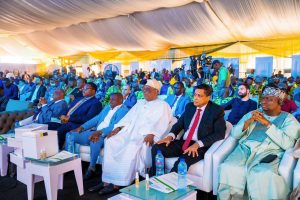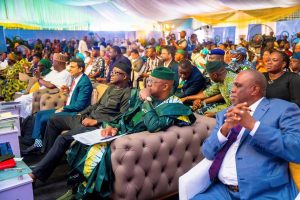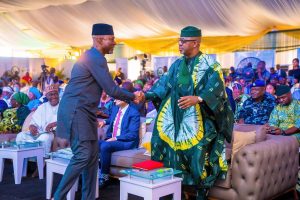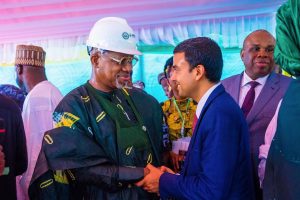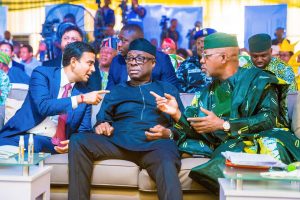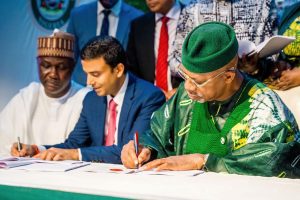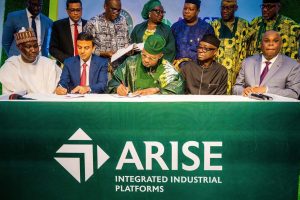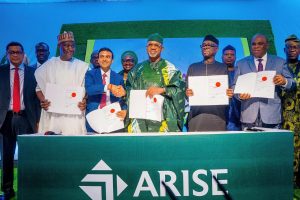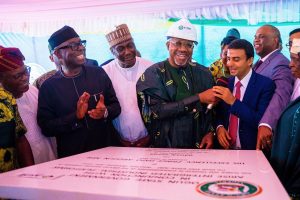society
Ogun: Abiodun Flags Off $400m Agro Processing Zone
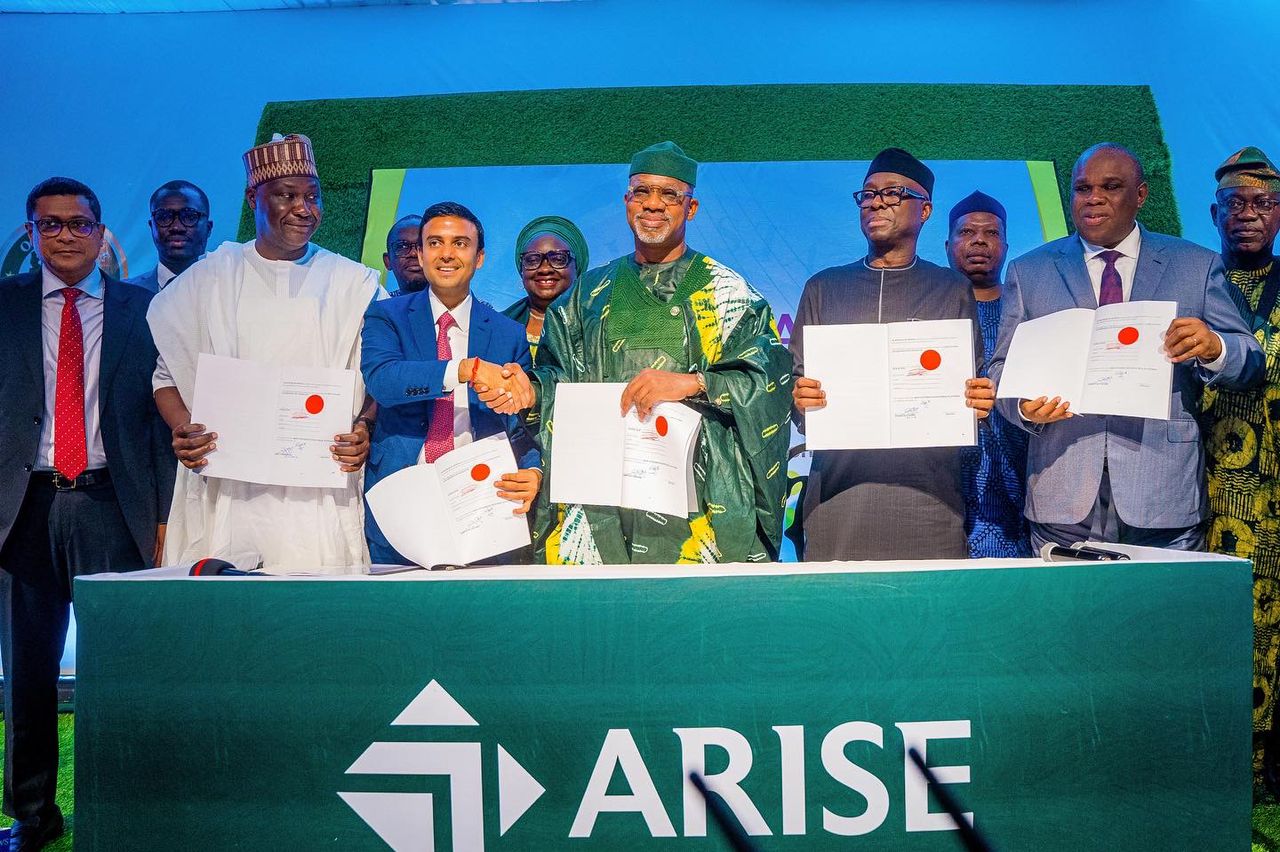
Ogun: Abiodun Flags Off $400m Agro Processing Zone
The Ogun State governor, Dapo Abiodun, on Friday, performed the groundbreaking of the development of the Ogun State Special Agro-Industrial Processing Zone (SAPZ) at the Agro Cargo International Airport, located in Ilisan-Remo.
The project with its first phase worth $400m is a collaboration between Arise Integrated Industrial Platforms and Ogun, according to the governor, would be completed in the record time of 18 months.
Speaking further, Abiodun said that the special industrial park for agro-processing and allied products is the first of its kind in the country and would generate over 20,000 direct jobs and individual prosperity.
The governor, who noted that the agro cargo airport will probably be the fastest constructed international airport on the continent.
He expressed his delight that the location of the airport that was till March 2021a forest and dump site has now become the airport city.
Abiodun disclosed that apart from the SAPZ, the Nigeria Customs Service has decided to locate one of its biggest facilities in the country and made full payment of N3.2b for the first 100 hectares of land last week .
While noting that the ground breaking was a further testament to the re-established trust between
government and the private sector, he assured that his administration would continue to work assiduously to earn the trust of private investors.
The governor added that the incumbent administration in the state would continue to engender policies and programmes that will remain people-oriented and enable the private sector to thrive.
Abiodun, while thanking the President of the Arise Group, Gangan Gupta for keying into the vision of making Ogun the industrial hub in the country, equally acknowledged the President of the African Development Bank, Dr. Akinwumi Adesina, for his support and encouragement to pursue the realization of the project.
“I must then acknowledge and thank the President of the AFREXIM, Dr. Ben ORAMA, who I called to discuss further the PPP/SAPZ model with and who arranged the physical meeting ARISE and myself. Without the trust and confidence Dr. ORAMA had in me, which was the basis of the reference in the first place we definitely won’t be here today.
“Of course all these had to be backed up by financing and I must thank the support of African Finance Corporation led by my brother, Zuberu Samaila, which ensured that the project was significantly derisked and AFREXIM bank for trusting us”, the governor stated.
He explained that the decision by his administration to turn the push factor from Lagos to the pull factor to Ogun, made it to introduce various policies and reforms, and also deploy technology to improve the efficiency of government and increase the state ranking on the ease of doing business index.
“Today, we are adjudged one of the safest if not the safest state in the country. We have constructed over 400km of both interstate roads in three years and six months and worth mentioning that we have at least one road in every one of our 20 local government areas and we have built over 1200 affordable homes across the state creating jobs for artisans.
“We will be back here very soon to commission our international agro cargo airport in another few months and our deep sea port is also loading”, Abiodun submitted.
The President of the ARISE Integrated Industrial Platforms, Gangan Gupta, said the company had invested in several African countries and he is happy to be in Ogun state, to contribute to its industrial development.
He added that the company would build industrial platforms that would transform the economy of Ogun.
Minister of Trade and Investment, Niyi Adebayo, in his remarks, described the project as a landmark and a step forward to the economic revolution of Nigeria.
He added that SAPZ would help in agri-industrialization and create jobs for the people, noting “this is going to be a regional trading hub.
While acknowledging that Ogun has a rich history in agriculture and agro processing in the country, the Minister commended the governor for his visionary leadership and brokering of the partnership which has attracted a multi million dollar project to the state.
The Chairman, the Senate Committee on Industries, Senator Adetokunbo Abiru, who described the project as an example of how the private sector can be harnessed for the economic development of Nigeria, expressed confidence that the SAPZ would boost the agricultural value chain, raise revenue, create jobs and boost export.
The Chairman of the African Finance Corporation, Sumaila Zubairu, said that the project sitting on 5,100 hectares of land, will change the landscape of Ogun in 18 months, noting that “through value-addition like this we can create jobs and wealth”.
“We will continue to play our role in enhancing the industrial development in Nigeria and Ogun”, Zubairu added.
Also, the AFREXIM Bank President, Benedict Oramah, attributed the peace and security in Ogun as key factors that attracted Arise Consurtium to it, commending the governor for creating enabling environment for foreign investment.
In his welcome address, the Commissioner for Finance and Chief Economic Adviser to the Governor, Dapo Okubadejo, noted that the SAPZ signified a major milestone in the economic revolution of Ogun state.
He disclosed that no fewer than 30 laws had been enacted to simplify business operations and reduce administrative bottlenecks in the state, adding six business clusters were also established across the state, to enhance investment drive.
society
Ramadan: Adron Homes Felicitates Muslims, Preaches Hope and Unity

Ramadan: Adron Homes Felicitates Muslims, Preaches Hope and Unity
Adron Homes & Properties Limited has congratulated Muslim faithful on the commencement of the holy month of Ramadan, urging Nigerians to embrace the virtues of sacrifice, discipline, and compassion that define the season.
In a statement made available to journalists, the company described Ramadan as a period of deep reflection, spiritual renewal, and strengthened devotion to faith and humanity.
According to the management, the holy month represents values that align with the organisation’s commitment to integrity, resilience, and community development.
“Ramadan is a time that teaches patience, generosity, and selflessness. As our Muslim customers and partners begin the fast, we pray that their sacrifices are accepted and that the season brings peace, joy, and renewed hope to their homes and the nation at large,” the statement read.
The firm reaffirmed its dedication to providing affordable and accessible housing solutions to Nigerians, noting that building homes goes beyond structures to creating environments where families can thrive.
Adron Homes further urged citizens to use the period to pray for national unity, economic stability, and sustainable growth.
It wished all Muslim faithful a spiritually fulfilling Ramadan.
Ramadan Mubarak.
society
Underfunding National Security: Envelope Budgeting Fails Nigeria’s Defence By George Omagbemi Sylvester

Underfunding National Security: Envelope Budgeting Fails Nigeria’s Defence
By George Omagbemi Sylvester | Published by saharaweeklyng.com
“Fiscal Rigidity in a Time of Crisis: Lawmakers Say Fixed Budget Ceilings Are Crippling Nigeria’s Fight Against Insurgency, Banditry, and Organized Crime.”
Nigeria’s legislature has issued a stark warning: the envelope budgeting system; a fiscal model that caps spending for ministries, departments, and agencies (MDAs) is inadequate to meet the country’s escalating security challenges. Lawmakers and budget analysts argue that rigid fiscal ceilings are undermining the nation’s ability to confront insurgency, banditry, kidnapping, separatist violence, oil theft and maritime insecurity.
The warning emerged during the 2026 budget defence session for the Office of the National Security Adviser (ONSA) at the National Assembly in Abuja. Senator Yahaya Abdullahi (APC‑Kebbi North), chairman of the Senate Committee on National Security and Intelligence, decried the envelope system, noting that security agencies “have been subject to the vagaries of the envelope system rather than to genuine needs and requirements.” The committee highlighted non-release or partial release of capital funds from previous budgets, which has hindered procurement, intelligence and operational capacity.
Nigeria faces a multi‑front security crisis: persistent insurgency in the North‑East, banditry and kidnappings across the North‑West and North‑Central, separatist tensions in the South‑East, and piracy affecting Niger Delta oil production. Despite declarations of a national security emergency by President Bola Tinubu, lawmakers point to a “disconnect” between rhetoric and the actual fiscal support for agencies tasked with enforcement.
Experts warn that security operations demand flexibility and rapid resource allocation. Dr. Amina Bello, a public finance specialist, said: “A static budget in a dynamic threat environment is like sending firefighters with water jugs to a forest fire. You need flexibility, not fixed ceilings, to adapt to unforeseen developments.”
The Permanent Secretary of Special Services at ONSA, Mohammed Sanusi, detailed operational consequences: irregular overhead releases, unfulfilled capital appropriations, and constrained foreign service funds. These fiscal constraints have weakened intelligence and covert units, hampering surveillance, cyber‑security, counter‑terrorism and intelligence sharing.
Delayed capital releases have stalled critical projects, including infrastructure upgrades and surveillance systems. Professor Kolawole Adeyemi, a governance expert, emphasized that “budgeting for security must allow for rapid reallocation in response to threats that move faster than political cycles. Envelope budgeting lacks this essential flexibility.”
While the National Assembly advocates fiscal discipline, lawmakers stress that security funding requires strategic responsiveness. Speaker Abbas Ibrahim underscored that security deserves “prominent and sustained attention” in the 2026 budget, balancing oversight with operational needs.
In response, the Senate committee plans to pursue reforms, including collaboration with the executive to restructure funding, explore supplementary budgets and ensure predictable and sufficient resources for security agencies. Experts warn that without reform, criminal networks will exploit these gaps, eroding public trust.
As one policy analyst summarized: “A nation declares a security emergency; but if its budget does not follow with real resources and oversight, the emergency remains rhetorical.” Nigeria’s debate over envelope budgeting is more than an accounting dispute; it is a contest over the nation’s security priorities and its commitment to safeguarding citizens.
society
Rev. Mother Kehinde Osoba (Eritosin) Celebrates as She Marks Her Birthday

Rev. Mother Kehinde Osoba (Eritosin) Celebrates as She Marks Her Birthday
Today, the world and the body of Christ rise in celebration of a rare vessel of honour, Rev. Mother Kehinde Osoba, fondly known as Eritosin, as she marks her birthday.
Born a special child with a divine mark of grace, Rev. Mother Eritosin’s journey in God’s vineyard spans several decades of steadfast service, spiritual depth, and undeniable impact. Those who know her closely describe her as a prophetess with a heart of gold — a woman whose calling is not worn as a title, but lived daily through compassion, discipline, humility, and unwavering faith.
From her early days in ministry, she has touched lives across communities, offering spiritual guidance, prophetic insight, and motherly counsel. Many testify that through her prayers and teachings, they encountered God in a deeply personal and transformative way. Near and far, her influence continues to echo — not only within church walls, but in homes, families, and destinies reshaped through her mentorship.
A mother in every sense of the word, Rev. Mother Kehinde Osoba embodies nurture and correction in equal measure. As a grandmother, she remains energetic in purpose — accommodating the wayward, embracing the rejected, and holding firmly to the belief that no soul is beyond redemption. Her life’s mission has remained consistent: to lead many to Christ and guide them into the light of a new beginning.
Deeply rooted within the C&S Unification, she stands tall as a spiritual pillar in the Cherubim and Seraphim Church globally. Her dedication to holiness, unity, and prophetic service has earned her widespread respect as a spiritual matriarch whose voice carries both authority and humility.
As she celebrates another year today, tributes continue to pour in from spiritual sons and daughters, church leaders, and admirers who see in her a living reflection of grace in action.
Prayer for Rev. Mother Kehinde Osoba (Eritosin)
May the Almighty God, who called you from birth and anointed you for His service, continually strengthen you with divine health and renewed vigour.
May your oil never run dry, and may your prophetic mantle grow heavier with greater glory.
May the lives you have nurtured rise to call you blessed.
May your latter years be greater than the former, filled with peace, honour, and the visible rewards of your labour in God’s vineyard.
May heaven continually back your prayers, and may your light shine brighter across nations.
Happy Birthday to a true Mother in Israel — Rev. Mother Kehinde Osoba (Eritosin).
More years.
More anointing.
More impact.
If you want this adapted for a newspaper page, church bulletin, Facebook post, or birthday flyer, just tell me the format and tone.
-

 celebrity radar - gossips6 months ago
celebrity radar - gossips6 months agoWhy Babangida’s Hilltop Home Became Nigeria’s Political “Mecca”
-

 society6 months ago
society6 months agoPower is a Loan, Not a Possession: The Sacred Duty of Planting People
-

 society5 months ago
society5 months agoReligion: Africa’s Oldest Weapon of Enslavement and the Forgotten Truth
-

 news6 months ago
news6 months agoTHE APPOINTMENT OF WASIU AYINDE BY THE FEDERAL GOVERNMENT AS AN AMBASSADOR SOUNDS EMBARRASSING

